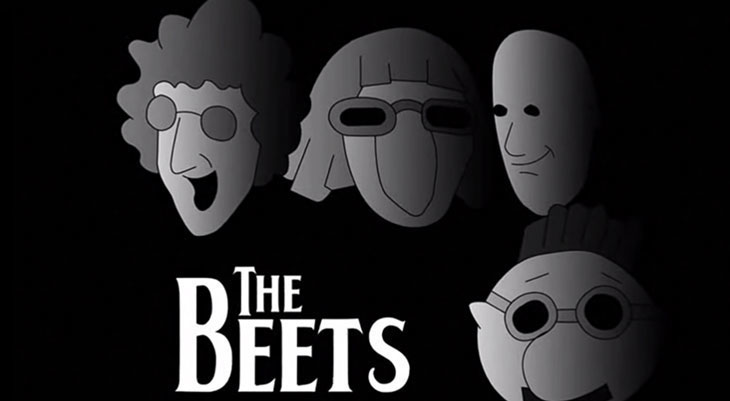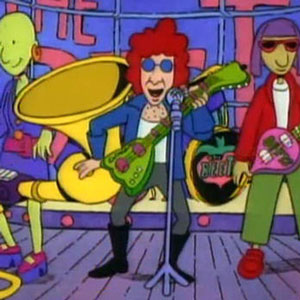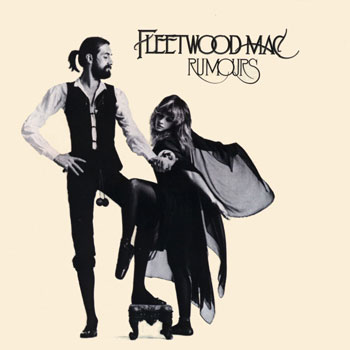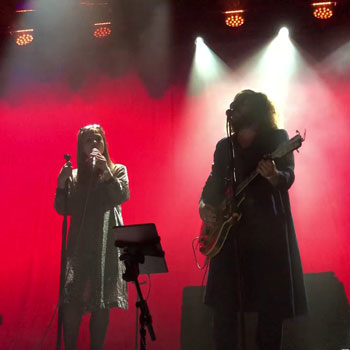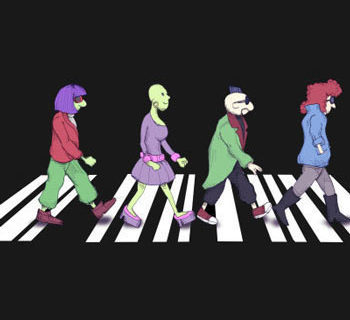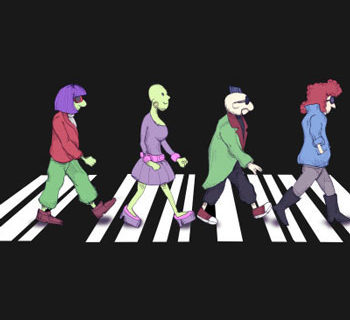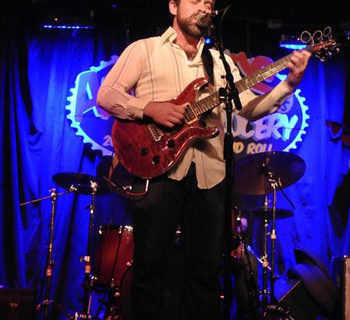The Beets had found their footing with We’re Back, but, it turned out they had, in actuality, climbed out of a pit and stepped into quicksand.
Lipman: There’s a reason bands break up, you know? Not everybody can be Green Day.
Flounder: The excitement for our followup to We’re Back! dried up almost immediately. We had been making music together, touring together, for years at this point. And we all had outside interests.
Yoder: Candy filed for divorce right after We’re Back!, and all I wanted to do was make breakup songs. But that’s not what The Beets did. We weren’t The Cure.
Lipman: Monroe was in a pissy mood because of his divorce, and he just wasn’t bringing anything to the table. And Wendy was busy with her animal conservation bullshit. She had been picking up weird animals for years, like her bloody fruit bat. She just didn’t seem to give a shit about music anymore.
Nespah: I thought protecting animals was more important than The Beets. I still think protecting animals is more important than The Beets. I’ve heard Chap bitch about it for years, but I’m not going to change my mind.
I thought protecting animals was more important than The Beets. I still think protecting animals is more important than The Beets. I’ve heard Chap bitch about it for years, but I’m not going to change my mind.
Flounder: We were constantly at one another’s throats. Chap and I got in a fight. One time, I showed up to the studio at eight in the morning. We weren’t supposed to be there until 10, but I wanted to get there early to work on some of my guitar parts. I walk in the door, and I see Chap, and he’s playing my fucking guitar. I asked him what was going on. It turns out, he had been there all night, re-recording all our parts. Mine, Wendy’s, Monroe’s. I said to him, “If you want to be a bloody solo artist, then leave us out of it!”
Lipman: I do regret re-recording everybody’s parts. I mean, I thought it sounded better, but that wasn’t within my rights as a member of the band.
Horseshack: Eventually, I just got sick of all the toxicity. After one recording session ended, I let everybody know, “Guys, it’s been fun, but this is the last album I will work with you on.”
Nespah: When Brian said he was dropping the band, we knew The Beets were done.
Yoder: We all came to the realization that The Beets could no longer exist. It was killing us. At least, once we realized this was our final album, my sad songs fit.
Lipman: We could do what we wanted, since we didn’t have to worry about sales, and it felt right to take a somber tone for the album, which we called Let It Beet. Even though none of us wanted to be in the band anymore, we know our fans wouldn’t be greeting this with the sense of relief we were.
Martinelli: Let It Beet is a beautiful album. It makes me tear up every time I listen to it.
Flounder: We were all happy with how the album turned out, although we fought tooth and nail until the bitter end.
Let It Beet is a beautiful album. It makes me tear up every time I listen to it.
Lipman: When we realized it was our last album, suddenly the battle became, “Who will get the final song on the final Beets album?” As the bloke who wrote 75 percent of the songs we ever recorded, I figured I was entitled to it.
Nespah: Chap was going to bitch until we agreed to let him cap the album with his own song. Eventually, I just let him have it. It was either never releasing the album, and never ending The Beets, or just letting Chap have his way.
Flounder: I don’t even think “Memories of a Cloud” is that good of a song. Chap has written 20 better songs alone. But that’s the final Beets song. There’s nothing I can do about that.
Horseshack: Obviously, we promoted Let It Beet as The Beets’ final album. Fans were crushed, but they also bought a ton of copies. The Beets ended with a No. 1 album. They had returned to the mountaintop.
Flounder: It probably goes without saying we didn’t tour behind Let It Beet. We all went our separate ways. I couldn’t get out the bloody door fast enough. I called up a couple of mates, and we formed a new band with a totally different sound. We didn’t chart, but that was fine. I had enough career success from The Beets to last a lifetime.
Nespah: I didn’t play music for a little while after the Beets ended. I traveled the world. I met character actor Emilio Estevez. It was peaceful.
Yoder: I had lost my marriage, and lost my band, so I wasn’t in the mood to do much of anything. I started drinking heavily for a while. Wendy helped me get sober a few years later. She doesn’t like me mentioning that, because it makes her uncomfortable, but I owe her a lot.
Lipman: I released a solo album as Chap Lipman, but people just thought of me as “the drummer from The Beets,” and nobody wants to buy an album by a drummer. I mean, people liked that Tommy Lee music video with all the naked people, but did anybody buy that bloody album? Nobody’s that stupid!
Horseshack: After the breakup of The Beets, I didn’t work with them again. I didn’t even talk to them for years. I kept working, of course. I managed Natalie Imbruglia for a little while. I’m the one who suggested she cover the song “Torn,” so, you know, my career was fine.
Lipman: I never thought we’d get back together. I never thought I’d talk to Wendy or Flounder again. Monroe and I were longtime mates, and that wasn’t going to end, but I didn’t think we’d play music together. Eventually, I did start getting the itch, though. I guess I didn’t purge The Beets from me entirely.
Flounder: We had offers to reunite all the time, obviously. Some really good offers, too. We got offered a crazy amount of money to play at halftime of the Freedom Bowl in Anaheim, but we turned them all down. If I had known we would get together again someday, I would have just agreed to do that show.
Lipman: I had just hung out with Monroe, and we had a good time. And… I don’t remember how he got a hold of me, but I had a message from some kid.
Doug Funnie (former child): My school was having our annual Spring Fling-A-Ding Dance. I really wanted to get The Beets to reunite to… well, impress a girl. I can’t really say more, on account of the restraining order. Anyway, I don’t know why I had the balls to think I could get The Beets to reunite, but I still tried. What could it hurt? If I got to hear Chap Lipman tell me to fuck off, it’d be worth it.
Lipman: Some random kid asking me to play at his school dance was ridiculous, but it was in Bluffington, where we had really cracked “I Need Mo’ Allowance.” So I called up Monroe, almost as a joke. And then he was into it.
Some random kid asking me to play at his school dance was ridiculous, but it was in Bluffington, where we had really cracked “I Need Mo’ Allowance.” So I called up Monroe, almost as a joke. And then he was into it.
Yoder: At first, me and Chap figured we’d go down to this dance to have a laugh. “Here’s two guys from The Beets at a school dance” you know? Then, I ran into Flounder at Cheetah Chrome’s birthday party and I mentioned to him.
Flounder: Monroe told me him and Chap were going to go to some school dance as a lark. Usually, I’m not in a joking mood, especially when it comes to The Beets. I don’t know what struck me that night. I was really high, to be fair. But I said yes, and when I sobered up, I kept my commitment.
Lipman: After Flounder agreed to show up with us, our little joke got kind of serious. We also had to ask Wendy, if only so she got the chance to say “no.”
Nespah: I had just gotten back from Australia, when I get this message that the fellas were going to reunite. Well, I wasn’t going to let a Beets reunion without me. I wasn’t going to get framed as the asshole who sat out a Beets reunion.
Funnie: Next thing I knew, I was hearing that The Beets were going to show up for the Spring Fling-A-Ding Dance. Their only request was we not publicize it. They didn’t want it to be a big “thing.”
Yoder: That day in the school gymnasium was the first time we had all seen each other since the breakup. We tried our best to keep things loose, but it was hard.
Nespah: We were looking forward to playing together one more time. Well, at least I was. I don’t know if everybody was.
Lipman: When it was me and Monroe goofing off, I thought it would be a fun night. Then, it became a big deal, and all the fun came out of it. Then, the banana thing happened.
Horseshack: Every one of those bloody wankers has given me a different version of the banana argument. I don’t know what really happened, and I don’t care. The Beets blew off a reunion concert, for children, because of a fight over a god damn banana. To me, that says they didn’t really want to play again.
Funnie: Looking back at it, as an adult, I think The Beets realized what was happening, and it just made them queasy. They didn’t really care about that banana. They just needed an excuse to not play.
Flounder: After that night, I swore I’d never entertain another reunion. The Beets were done for good. And we’ve all stuck to that to this day.
Nespah: After that night in Bluffington, I decided to go back to college. I studied law. I used it to make some good investments with my Beets money, and I was rolling in cash. I was able to buy a mansion and turn my estate into an animal sanctuary.
Yoder: I did not manage my money well. I had my divorce, and I had my drug and alcohol issues. I never had any success as a musician outside The Beets. Chap tried to help me out by including me in some of his musical projects, but they only paid a pittance. I also invested in an ostrich farm, and then every ostrich was eaten by dingoes, and the farm wasn’t insured. So, uh, Wendy sort of took me in and gave me a job.
Nespah: A lot of people say that Monroe ended up my butler, but that’s not fair to him. He was in trouble, and I needed help, and he offered to help me. He’s still my old bandmates. He wasn’t the hired help. And he ended up getting back on his feet.
Yoder: I have a show on Sirius XM now, so that’s nice. Occasionally, I do spin some Beets songs. I still love the music. I don’t feel bad about playing “I Sneezed on My Face.” It’s a great song. I just happened to write it.
Flounder: I got involved in one of those music reality contests before they really hit it big. It was a bit of a wankfest, but it paid great. I started some new musical projects after that, tried to do something arty. I tried to work with some younger musicians. I didn’t want to be the old fuck playing the same shit from 20 years ago.
Horseshack: Flounder is the only one of those guys who has had any musical success after The Beets, and I’m sure that drives Chap nuts.
Lipman: I released an album three years ago that was one of the top 10 albums in the United Kingdom the week it came out, so I’m doing just fine. Someday, I’d like to just be Chap Lipman, and not Chap Lipman from The Beets, but it is getting less and less likely that will happen.
Nespah: I have no desire to ever play music again. My days as a musician are done. That’s not to say I don’t have fond memories of my time in The Beets. We are one of the biggest bands in the world for a little while. I didn’t do much writing, so I maybe don’t feel the same connection to the music the other guys do, but I am proud of our legacy. If somebody tells me they love The Beets, I always tell them “Thanks.” I don’t run from it.
The Beets are an unjustly overlooked band. They don’t get mentioned as they should. Their music was great, and their story was fascinating. It’s really a story worth an extensive oral history.
Anchovy: What’s the legacy of The Beets? They were one of the best mainstream rock bands. They really made music people wanted to listen to. Were they game changers? No. Nobody went out and started a band because of The Beets, unless it was in opposition to them. But they made catchy tunes, and they sold a ton of records. They were sort of the embodiment of populism, for better or worse.
Lipman: The Beets were the best band in the world. I really believe that. Try and argue otherwise. Try and deny “Killer Tofu.” I think we should be in the Rock and Roll Hall of Fame, frankly. Maybe we will be someday. It took Steve Miller Band years to get in, but they made it. Someday we will too.
Yoder: I loved being in The Beets, and I hated being in The Beets. I am, forever, the lead singer of The Beets. I can always say that. I don’t know if we were that great. I do think we were good, and people did love us. And I am always appreciative of our fans. In the end, I can say “I wrote a No. 1 hit.” How many people can say that?
Martinelli: I’ve worked with dozens of bands. Maybe hundreds. I can’t say The Beets were my favorite, because they could be hard to work with. If they hadn’t found success when they did, that band would have imploded. It was four individuals pretending to be a band, but what a band.
Horseshack: The Beets made my career. I can’t call them friends, but I can call them a great band.
Funnie: The Beets are forever my favorite band. I still sing “Killer Tofu” to myself all the time. I’ve got the lyrics to it tattooed in my ribcage. They are everything to me, even still.
Flounder: I feel like we were a blue collar band. I know that may seem pretentious, considering how much money we made. But Monroe and Chap were two blokes from a council estate. Wendy and I were poor f*cks for years playing in bands. We sang about relatable things. Our music wasn’t difficult or challenging. That may make people think less of us, but fuck ‘em, ya know? The Beets were for everybody. They still are, and I’m proud of that.
Chris Morgan (writer): The Beets are an unjustly overlooked band. They don’t get mentioned as they should. Their music was great, and their story was fascinating. It’s really a story worth an extensive oral history.
Terry Pelayo (editor, Rawckus): When Chris suggested the idea of a Beets oral history, right away I was on board. Who doesn’t want to hear about the band behind “Killer Tofu?” Plus, oral histories are very popular on the internet. It just made sense.
Morgan: So I got the go ahead for The Beets oral history, and I got all the interviews and did all the work and talked to all the people. And then, to explain this to you, I had to record myself, because it’s an oral history, so, by law, it has to be a collection of things people say. That’s what makes it oral. So I have to say all this into a recording device. Although, I probably don’t need to include it all in the final piece. That probably covers it. End transmission.

